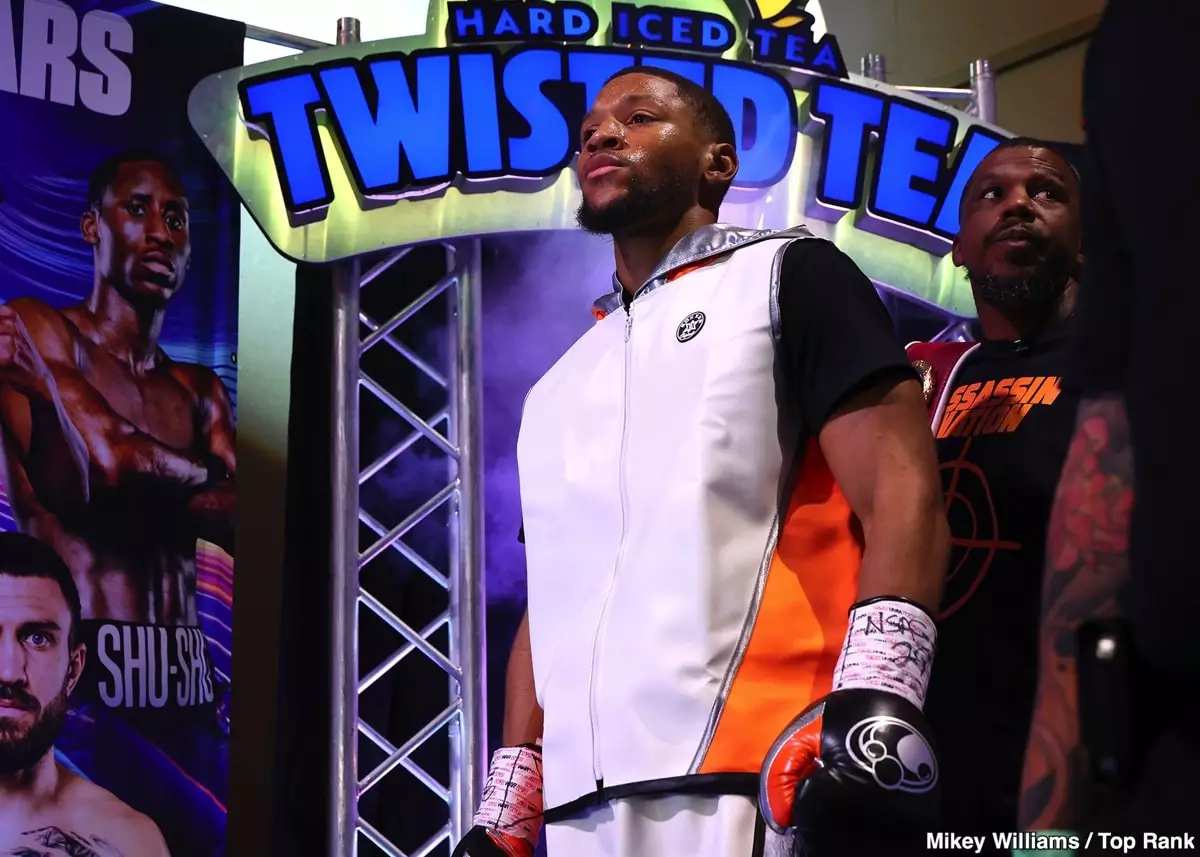The boxing world recently braced itself for what promised to be a thrilling unification bout between WBO welterweight champion Brian Norman Jr. and IBF titleholder Jaron “Boots” Ennis. Fans anticipated action-packed moments where these two young, powerful fighters would showcase their skills in the ring. However, negotiations crumbled, leaving many eager supporters disillusioned. As the dust settles, the blame game begins, with Trainer Derek “Bozy” Ennis pointing fingers at Norman Jr. for the downfall of discussions that could have led to a titanic clash.
At the heart of these negotiations was an offered purse of $1.7 million from promoter Eddie Hearn. Norman Jr. reportedly rejected this as he sought a raised offer of $2.2 million instead. While he expressed concerns over expenses owed to his promoter Bob Arum, conversation surrounding these financial demands raises questions about the priorities of a fighter eager to prove himself on the world stage. Did Norman Jr. miscalculate the true value of such an opportunity? Or did Ennis and his camp mismanage the situation, leading to a breakdown of what could have been a historic fight?
The Financial Tug-of-War
The disparity between the two offers paints a vivid picture of boxing’s ongoing struggle between financial security and the pursuit of greatness. Norman Jr.’s insistence on bumping the offer from $1.7 million to $2.2 million is indicative of a larger issue in boxing, where promoters often resist awarding fighters the full value they deserve. The notion that Norman Jr. was willing to accept the initial offer on neutral ground in Las Vegas should be seen not only as a negotiation tactic but also as an admission that favorable terms aren’t always handed out. However, it raises the question: Was holding out for more money worth potentially squandering a chance at higher prestige in the form of a title fight?
When viewers analyze the circumstances from Norman Jr.’s perspective, his demands, while ambitious, reflect a fighter’s right to negotiate for due recompense. Jaron Ennis, with his undefeated record and rising star power, was undoubtedly a formidable opponent. Yet the allure of a title fight often overshadows financial negotiations. One must wonder if both camps, driven by pride or miscalculation, failed to prioritize what mattered most: the fight itself.
The Narrative Shift: Ennis’ Unreadiness
Following the failed negotiations, Ennis found himself defending his IBF title against mandatory challenger Karen Chukhadzhian on November 9, an encounter that turned out to be less than impressive. Observers noted that Ennis struggled mightily against a fighter many expected him to defeat with ease, resulting in a controversial decision that left audiences questioning his readiness for marquee matchups. In hindsight, could the loss of that anticipated showdown against Norman Jr. have contributed to Ennis’ performance?
Rumors circulated amongst fans that Ennis and his team lacked the appetite to face an opponent of Norman Jr.’s caliber. This notion transforms the narrative from one of missed opportunities to potential fear of the unknown—caught between the promise of financial gain and the risk of failure. Perhaps the fear of facing a dangerous contender like Norman Jr. influenced the dynamics of the negotiations, leading Team Ennis to opt for a less challenging path rather than stepping up to claim what was rightfully theirs.
Fool’s Gold in Decision-Making
Trainer Bozy Ennis’s commentary regarding Norman Jr.’s previous earnings seems misplaced and misguided. While he argues that a fighter’s financial history should not influence their current asking price, it implicitly reflects a lack of understanding of the current landscape of boxing. Fighters are constantly fighting against the backdrop of market conditions, and while $100,000 in the past may seem trivial, it forces them to consider future profitability. In this landscape, lucrative offers serve as essential milestones in the careers of fighters hoping to solidify their legacies.
Bozy’s contention—if the opportunity truly mattered, Norman Jr. should have taken the fight—is an oversimplification. It overlooks the inherent complexities of ambition, fear, and the high-stakes nature of the sport. As the narrative unfolds, it becomes evident that strategic decision-making plays a crucial role. Bulking the amount offered can sometimes yield a more substantial payout years down the line, as opposed to engaging in a fight that could lead to significant repercussions.
The boxing world is filled with stories of potential unfulfilled, but the tragic reality is that financial negotiations often overshadow the thrill of competition. Ennis and Norman Jr.’s standoff serves as a salient reminder that opportunities, while precious, must be evaluated with both emotional and financial currency in mind. As boxing continues to evolve, understanding the intricate balance between purse and pride could ultimately dictate the success or downfall of its brightest stars.

